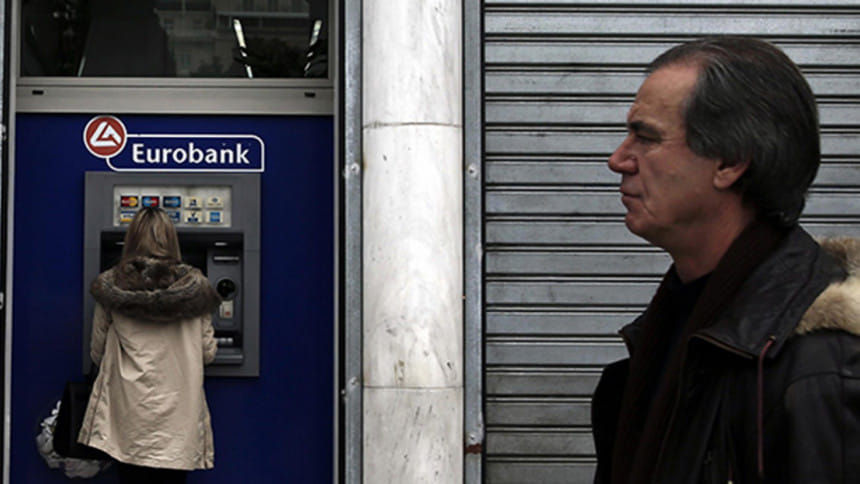Greece unveils eurozone reforms

Greece has unveiled an outline summary of reforms demanded by eurozone leaders in order to secure a bailout extension.
The measures include plans to combat tax evasion and tackling fuel and tobacco smuggling.
Government officials said they were releasing the summary before formally submitting it to guard against leaks to the press.
The list must be approved by international creditors on Tuesday to secure a four-month loan extension.
Greece had previously delayed presenting the reforms by 24 hours after initially agreeing to deliver its proposals to creditors on Monday.
Analysts say the deal's collapse would revive fears Greece will exit the euro.
The summary released on Monday evening contains measures that had been widely anticipated.
It outlined proposals to trim the civil service and combat corruption.
In addition, it included a commitment to address what Syriza has called Greece's "humanitarian crisis".
The far-left party has vowed to spend nearly 60m euros (£44m) on free electricity for the poor and more than 750m euros on a program of meal subsidies.
Such policies are aimed at fulfilling pre-election pledges to help those hit by years of economic crisis.
The main points of the summary of the proposals include:
- Creating a fairer tax system
- Combating tax evasion
- Tackling corruption
- Targeting fuel and tobacco smugglers
- Implementing labour reforms on collective contracts and bargaining agreements.
- Tackling Greece's "humanitarian crisis" with housing guarantees and free medical care for the uninsured unemployed.
Greece's creditors - the European Central Bank, the European Commission and the International Monetary Fund - are expected to deliver their verdict on the proposals later on Tuesday, before the reforms are discussed in a conference call with eurozone finance ministers.
Greece agreed an extension to its financial rescue programme with eurozone countries on Friday.
The four-month extension deal is widely regarded as a major climb-down for Prime Minister Alexis Tsipras, who won power in January vowing to reverse budget cuts.
Analysis: Mark Lowen, BBC News, Athens
Greece hasn't disclosed why the infamous list was delayed but insists it will arrive in Brussels on Tuesday. Drafts leaked to the Greek media suggest proposals broadly fall into three categories: tackling tax evasion, structural reforms and social measures that help the poor with healthcare or electricity bills and prevent those in debt from losing their homes.
It's not clear which will make the final list or whether the reforms will be accepted by Greece's creditors. If there's a fundamental disagreement, the deal to extend Greece's loan could collapse.
The government is likely to be forced into U-turns on some promises made before the election, such as raising the minimum wage or rehiring public sector workers.
The hard left of the governing party is opposed. But the majority of Syriza's supporters appear to be behind it, relieved at least that Athens is proposing reforms for the first time rather than being handed a fait accompli by its creditors.
'Long road ahead'
A spokesman for the German finance ministry, Martin Jaeger, was quoted by Reuters news agency as saying that Berlin expected the Greek plan to be "coherent and plausible".
Greek Finance Minister Yanis Varoufakis has said the bailout agreement will be "dead" if the list of reforms his government is drafting is not approved.
In effect, the deal has kicked down the road some of the more difficult issues, like the future sustainability of Greek debt, the BBC's Chris Morris reports from Brussels.
For now the focus is on steadying the ship, and trying to produce an interim plan, he adds.
On Friday, German Finance Minister Wolfgang Schaeuble stressed that there would be no payment of new funds to Greece until the conditions of the deal had been met.
Tsipras said in a televised address the following day that his government had "won a battle, not the war".
He called the deal an "important negotiating success" but warned that there was a "long and difficult road ahead".
Greek economy in numbers
- Unemployment is at 25%, with youth unemployment almost 50% (corresponding eurozone averages: 11.4% and 23%)
- Economy has shrunk by 25% since the start of the eurozone crisis
- Country's debt is 175% of GDP
- Borrowed €240bn (£188bn) from the EU, the ECB and the IMF

 For all latest news, follow The Daily Star's Google News channel.
For all latest news, follow The Daily Star's Google News channel. 



Comments